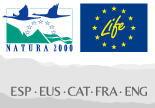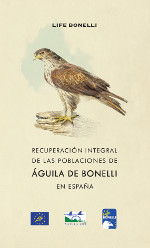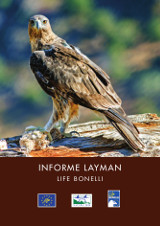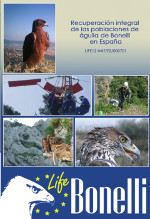
No end to the electrocution of Bonelli’s Eagles: this time it happened to 'Álora'
As in previous occasions (sadly too many), we regret to inform you about the loss of another animal we had been monitori...
First egg of a Bonelli’s Eagle in 2016
Our captivity breeding team observed attentively the cameras, but finally the female Bonelli’s Eagle chose to lay her fi...
At your disposition the Virtual Library of the Bonelli’s Eagle
In the Virtual Library of the Bonelli’s Eagle we offer you around 300 documents related to the Bonelli’s Eagle, its cons...
Life Bonelli: Improvement measures of habitat in Navarra
As part of the Life Bonelli Project, several improvement measures of the habitat of Bonelli’s Eagles are planned. During...
E1.A project presented in Palma de Mallorca to protect the Bonelli's Eagles in the Iberian Peninsula
- Details
- Created: 23 December 2013
- Hits: 1765
Experts from more than ten autonomous Spanish communities and France met in Palma de Mallorca for the first conference of LIFE BONELLI. The conference provided an introduction to the actions already begun by the project, which for the first time intends to fully restore the Spanish population of one of the most threatened raptors in the Mediterranean region.

During the three-day conference, more than 50 experts in the study and conservation of the Bonelli's Eagle presented their papers regarding the current situation of the species, largely in its Iberian dispersal, and detailed the results of the measures adopted over the last few years to tackle the main threats. The information supplied and debates held will be extremely useful in the development of LIFE BONELLI, the project that globally deals with the recovery of the Spanish population of this raptor for the first time.
The participants, hailing from over ten autonomous Spanish communities and France, became aware first-hand of the results of the initial project measures and they were able to verify the inevitably high expectations. In turn, the meeting helped to explore the collective experience of other similar projects with the Bonelli's Eagle in Spain, most of which is due to the funding of the LIFE project by the EU.
The conference opened on 12 December by Neus Lliteras, General Director of the Environment for the Balearic Government and closed on 14 December with a celebration of "The Day of the Eagle," an event which marks the beginning of LIFE BONELLI and whose first announcement took place in the Santa Eugenia Nature Reserve (Mallorca). The project has a budget of two million euros, of which the European Union contributes 75%, with implementation until 2017. During this period, it shall attempt to recovery the Bonelli's Eagle population in territories it has historically inhabited.
The main goal is to release specimens via an experimental process, in the Community of Madrid, Navarre and Mallorca. In one of the established release zones on this island, located at the heart of the Tramuntana mountain range, a pair of reintroduced birds has been established. The participants at the conference were able to visit this area and they were even lucky enough to observe the male of this pair.
The LIFE BONELLI Project is the collaboration of the following members: the Junta of Andalusia, the Community of Madrid, the Provincial Council of Álava, as well as the companies: Navarre Environmental Management (GAN), Recovery Group for Native Wildlife and Habitats (GREFA), the Committee for the Recovery of Wildlife on the Balearic Islands (COFIB) and the French NGO, The French League for the Protection of Birds (LPO).

Collaborative spirit between the participants
The Spanish population of the Bonelli's Eagle (also known as the águila perdicera in Spanish), which is the highest in Europe, consists of less than a thousand pairs. According to the “Red Book of Birds in Spain”, the species has undergone a drastic decline in the northern part of the Iberian Peninsula and its previously high eastern and Catalan populations have also suffered sharp declines, in such a way that the only stable areas are located in Andalusia and Extremadura.
At the conference in Palma de Mallorca, attendees discussed the point to which the present situation of the Bonelli's Eagle, listed as “Vulnerable“ on the Spanish List of Threatened Species, worries the experts who study and work for its conservation, as the recovery process for other emblematic raptors such as the Spanish Imperial Eagle is not being contemplated.
Indeed, a factor that may greatly benefit the species at a time when it is most in need of support was the amount of collaboration and understanding in regard to the objectives that were prioritised at the LIFE BONELLI conference, as highlighted by the organisers as well as the participants
Photo News
Latest News
- 29 January 2016 No end to the electrocution of Bonelli’s Eagles: this time it happened to 'Álora'
- 22 January 2016 First egg of a Bonelli’s Eagle in 2016
- 11 January 2016 At your disposition the Virtual Library of the Bonelli’s Eagle




































